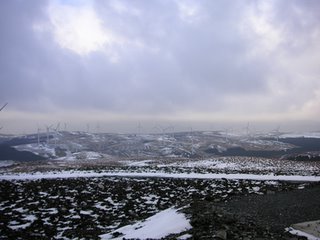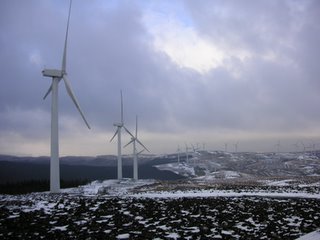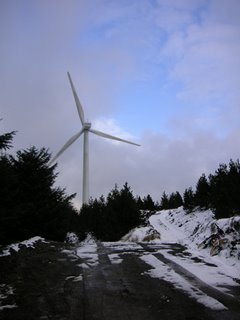Progress?
Suffering from a bit of cabin fever this afternoon, I decided on a whim to go for a bicycle ride. When we strolled the dogs earlier, I had abandoned all ideas of doing anything outdoors later, since the weather was so foul - a freezing wind hurling icy shards into our faces as we battled to stay upright against the gale. But after lunch things calmed down a bit, or so it seemed. So I packed up my old kit bag and set off for the windfarm.
Cefn Croes* is the most powerful windfarm in Wales. It has thirty-nine turbines ranging in height from eighty-nine to a hundred metres - these things are big - and at full chat, like it was going today, it produces enough electricity for 42,000 homes. Allegedly it will save four million tonnes of carbon dioxide being dumped into the atmosphere in its twenty-five year life. It's part of a plan by the Welsh Assembly Government (known as WAG, but not to its face) to generate 10% of the country's electricity by renewable sources by 2010.
All very splendid, all very laudable. But it's an ugly thing, noisy too when you're up there. And during the construction phase they made a hell of a mess, which will take several years to recover at that altitude (over five hundred metres). The only thing immediately in its favour, as far as I'm concerned, is the miles and miles of splendid bicycling tracks the construction opened up.
Central Wales has gained a reputation as the windfarm centre of Europe. You can see over three hundred from the top of Plynlimon on a good day. Plans are afoot to build another three hundred plus within a fifty mile radius of Cefn Croes. And therein lies the problem.
I'm not a great nimby when it comes to windfarms. We need electricity and I don't think they really spoil the skyline any more than endless square marches of alien sitka spruce, or indeed the dull rolling moorland that is a product of the sheep industry - there's no such thing as virgin countryside anymore. But wind generation relies on there being wind. For all it's reputation as a wild and storm-lashed place, there are times when we go for days without a breath of a breeze in the air across the whole of Wales. Quite often you look to the horizon and see hundreds of expensive turbines generating bugger all electricity.
It's unusual in the UK for it to be calm everywhere. If we've got it still, then Aberdeen's probably in a force ten. So it doesn't take a genius to work out that you need to spread your windmills as far and wide as possible. Not try and whack a thousand of them up within an hours drive of each other.
Personally I'd like to see more effort go into tidal and wave power generation - coast is something the UK has an overabundance of. Also off-shore windfarms, with huge fishing-boat exclusion zones around them (but that's a rant for another time). I think if the European Union was good for anything, then it should be encouraging an increase in biodiesel production instead of faffing about trying to keep French peasant farmers in tractors (but again, another rant, another day).
I'm not convinced of the wisdom of covering every hilltop in Wales in windmills.
* literally 'back crossing'. Cefn (pronounced almost exactly 'kevin') means 'back' in Welsh, and 'Croes' (pronounced 'kroys', with a sibilant s at the end, rather than a z sound) means 'cross' or 'crossing'. I presume it's so-called because it's the high pass over Myherin from civilisation to Aberystwyth, and only the truly foolhardy would ever use it. But I can't find out anywhere, so I could be wrong.
Cefn Croes* is the most powerful windfarm in Wales. It has thirty-nine turbines ranging in height from eighty-nine to a hundred metres - these things are big - and at full chat, like it was going today, it produces enough electricity for 42,000 homes. Allegedly it will save four million tonnes of carbon dioxide being dumped into the atmosphere in its twenty-five year life. It's part of a plan by the Welsh Assembly Government (known as WAG, but not to its face) to generate 10% of the country's electricity by renewable sources by 2010.
All very splendid, all very laudable. But it's an ugly thing, noisy too when you're up there. And during the construction phase they made a hell of a mess, which will take several years to recover at that altitude (over five hundred metres). The only thing immediately in its favour, as far as I'm concerned, is the miles and miles of splendid bicycling tracks the construction opened up.
Central Wales has gained a reputation as the windfarm centre of Europe. You can see over three hundred from the top of Plynlimon on a good day. Plans are afoot to build another three hundred plus within a fifty mile radius of Cefn Croes. And therein lies the problem.
I'm not a great nimby when it comes to windfarms. We need electricity and I don't think they really spoil the skyline any more than endless square marches of alien sitka spruce, or indeed the dull rolling moorland that is a product of the sheep industry - there's no such thing as virgin countryside anymore. But wind generation relies on there being wind. For all it's reputation as a wild and storm-lashed place, there are times when we go for days without a breath of a breeze in the air across the whole of Wales. Quite often you look to the horizon and see hundreds of expensive turbines generating bugger all electricity.
It's unusual in the UK for it to be calm everywhere. If we've got it still, then Aberdeen's probably in a force ten. So it doesn't take a genius to work out that you need to spread your windmills as far and wide as possible. Not try and whack a thousand of them up within an hours drive of each other.
Personally I'd like to see more effort go into tidal and wave power generation - coast is something the UK has an overabundance of. Also off-shore windfarms, with huge fishing-boat exclusion zones around them (but that's a rant for another time). I think if the European Union was good for anything, then it should be encouraging an increase in biodiesel production instead of faffing about trying to keep French peasant farmers in tractors (but again, another rant, another day).
I'm not convinced of the wisdom of covering every hilltop in Wales in windmills.
* literally 'back crossing'. Cefn (pronounced almost exactly 'kevin') means 'back' in Welsh, and 'Croes' (pronounced 'kroys', with a sibilant s at the end, rather than a z sound) means 'cross' or 'crossing'. I presume it's so-called because it's the high pass over Myherin from civilisation to Aberystwyth, and only the truly foolhardy would ever use it. But I can't find out anywhere, so I could be wrong.




Comments
To be honest with you, it burns me that we don't see fields of windmills around here. We see plenty of land lying unused, and we live in a windtunnel, but nobody is tapping into that resource, yet we've got more and more polution contaminating the air and the water supply and costing billions to clean up.
It's not a perfect world. Pros and cons both ways, I guess.